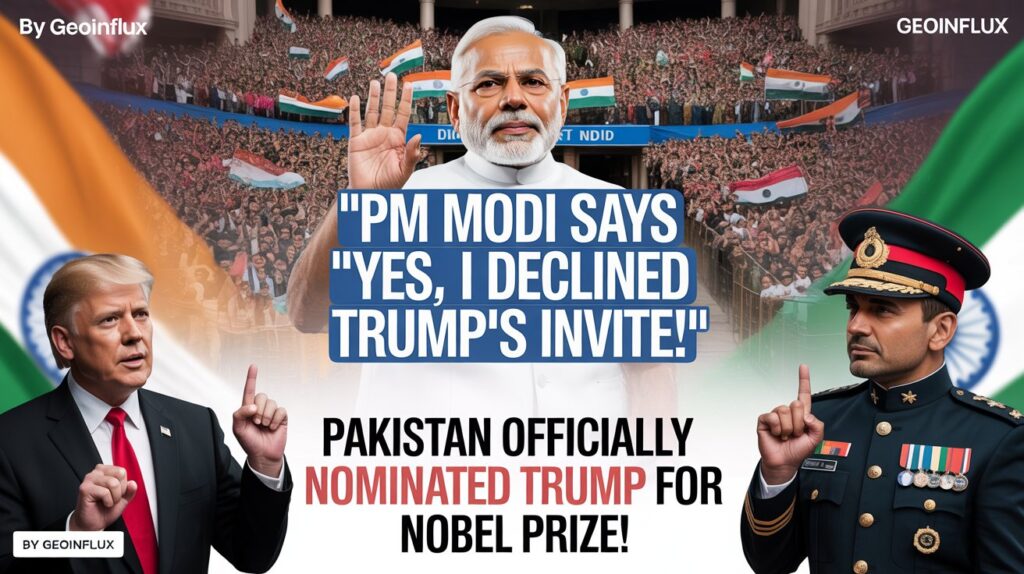Meta Description:
PM Modi rejects Trump’s invitation while Pakistan nominates him for a Nobel Peace Prize—an unfolding diplomatic twist shaping South Asia’s strategic equations.
📰 Introduction: A Tale of Two Diplomatic Gestures PM Modi Rejects Trump’s Invitation
In a surprising series of geopolitical moves, Indian PM Modi Rejects Trump’s Invitation, while at the same time, Pakistan has officially nominated Trump for the 2026 Nobel Peace Prize.
These conflicting signals paint a complex picture of diplomacy, strategy, and optics in an election-driven global order.
This story unfolds against a backdrop of changing U.S.-South Asia relations, upcoming U.S. elections, and Pakistan’s dire economic situation—all contributing to a rich tapestry of geopolitical recalibration.
🇮🇳 PM Modi Rejects Trump’s Invitation Publicly
Speaking with unusual candor, PM Modi Rejects Trump’s Invitation to visit Washington, D.C., following a G7 summit in Canada. Rather than attend the dinner hosted by Trump, Modi chose to travel to the Jagannath Temple in Puri for its reopening, citing his spiritual commitment as paramount.
“I told Trump that I must go to Maha Prabhu’s land,” Modi stated, as reported in Indian media.
This wasn’t just a personal decision—it was a powerful diplomatic message. Modi’s public rejection followed Trump’s repeated claims of offering to mediate the India-Pakistan conflict, a proposition India has firmly opposed for decades.
India’s then-Foreign Secretary Vikram Misri had earlier clarified that India never sought nor accepted any foreign mediation. Modi’s refusal can be seen as a reaffirmation of India’s independent foreign policy and its unwillingness to involve outside powers in its sensitive bilateral issues with Pakistan.
🇵🇰 Pakistan Nominates Trump for the 2026 Nobel Peace Prize
In stark contrast, the Government of Pakistan has officially endorsed Donald Trump for the Nobel Peace Prize, citing his claimed diplomatic intervention during a past India-Pakistan standoff that allegedly prevented a war.
The nomination, led by the establishment under General Asim Munir, highlights Trump’s supposed success in “diffusing nuclear tension between two arch-rivals.”
🧩 Political and Financial Motives Behind the Nomination?
Critics argue that the move is not rooted in genuine appreciation but rather a strategic effort to curry favor with the former U.S. President in anticipation of his potential political comeback.
- Pakistan is currently seeking loans from the IMF, World Bank, and ADB.
- Flattering Trump may be seen as a soft diplomatic strategy to improve ties and increase its bargaining power.
Interestingly, this praise comes despite Trump’s past accusations that Pakistan harbored terrorists and misused U.S. aid funds. His earlier administration even cut off significant military aid to Islamabad.
Yet, Pakistan now sees value in Trump’s personality-driven diplomacy, and is investing in that narrative—even reportedly encouraging support for Trump-related crypto ventures.
🇺🇸 Trump’s Response: Leveraging Nobel Nod for Election Campaign
While Trump himself doesn’t expect to win the Nobel Prize, he views the nomination as a valuable tool for “face-saving” ahead of the U.S. midterm and 2026 elections.
He plans to cite:
- His India-Pakistan peace intervention
- The Abraham Accords between Israel and Arab states
- Talks between Serbia and Kosovo, and Egypt and Ethiopia
Trump intends to repackage these events as proof of his peacemaking skills, especially when challenged over promises like “ending the Ukraine war in 10 days” or preventing conflict in the Middle East.
Trump once tweeted, “They won’t give me the Nobel Peace Prize, even though I did more for peace than Obama.”
🧠 Ignoring U.S. Intelligence and Embracing Pakistan’s Narrative?
Trump’s political narrative takes an even stranger turn when considering his dismissal of his own intelligence community’s reports, particularly those concerning Iran’s nuclear ambitions.
He contradicted the assessments of American intelligence leaders—like former Congresswoman Tulsi Gabbard, who emphasized that there was no credible evidence of Iran pursuing a nuclear bomb.
Trump reportedly said: “The Intelligence Community is wrong. National Intelligence is wrong.”
This signals an alarming departure from institutional analysis, while simultaneously accepting Pakistan’s version of the India-Pakistan conflict and his own role in it.
🌏 Strategic Implications for India-U.S.-Pakistan Relations
This sequence of events raises critical questions:
- Will Trump’s tilt towards Pakistan affect the bipartisan strategic partnership between India and the U.S.?
- How will this influence the broader Indo-Pacific strategy, where India plays a vital counterbalance to China?
So far, analysts suggest that India-U.S. ties are too deeply entrenched to be derailed by such posturing. Defense agreements, technology partnerships, and shared concerns about China ensure continuity across U.S. administrations.
However, the silence of U.S. authorities on internal Pakistani issues, like the incarceration of former PM Imran Khan, has not gone unnoticed in New Delhi—especially compared to the West’s frequent critiques of India’s democratic processes.
🔮 Conclusion: A Theater of Optics or Strategic Realignment?
The ongoing episode is more than a diplomatic curiosity—it’s a case study in modern geopolitics, where personal egos, electoral calculations, and economic needs influence international relations as much as traditional policy.
As Trump gears up for a possible return to the White House, and as South Asia continues to be a hotspot for global interests, this narrative of rejection and reward could resurface as a campaign flashpoint, a diplomatic test, or a strategic gamble.
💬 What Do You Think?
Do you believe Trump deserves the Nobel Peace Prize? Was Modi’s refusal a bold diplomatic move or a missed opportunity?
👉 Share your thoughts in the comments below and don’t forget to share this post!
🔗 Related Articles You May Like:
- Geopolitical Tremors: Israel-Iran Conflict 2025 and Pakistan’s Growing Vulnerability
- Balochistan on the Edge: How US-Iran Conflict Could Tear Pakistan Apart
- The G7 Summit 2025: Geopolitical Chaos, Trump’s Antics, and India’s Strategic Clarity
- Understanding Nobel Peace Prize Politics
- India-U.S. Strategic Ties: History and Future Outlook





Enjoyed studying this, very good stuff, regards. “It is in justice that the ordering of society is centered.” by Aristotle.
Everyone loves what you guys are up too. This sort of clever work and exposure! Keep up the amazing works guys I’ve incorporated you guys to blogroll.